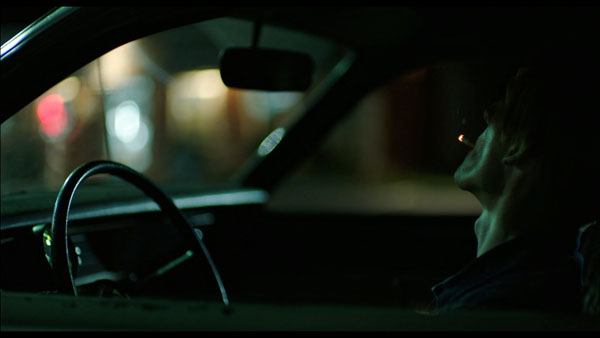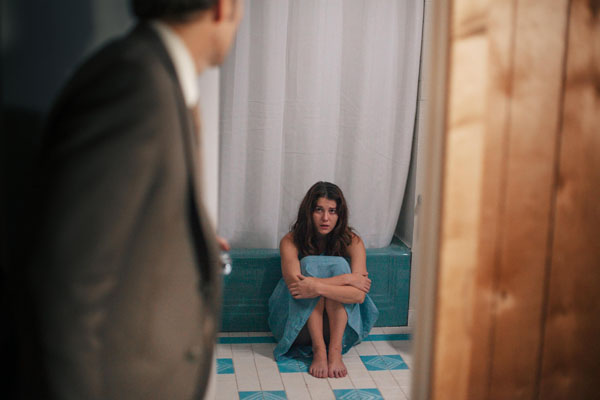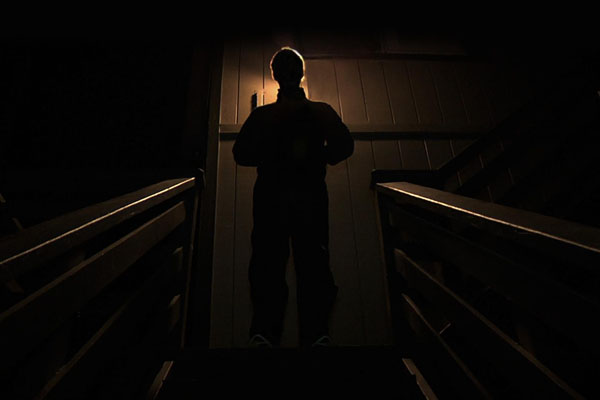The presentation of the awards on Tuesday seems to give some the impression that SXSW Film wraps after just a few days, but even taking into account Wednesday night’s horrible incident, it’s still going strong. Today sees one last full day of screenings before this year’s edition closes in the wee hours tomorrow morning with the announcement of a final round of audience awards. Meantime, Indiewire‘s Eric Kohn has issued a call to distributors to pick up some of the year’s most promising features; Beth Hanna and Anne Thompson have posted their top tens; and Genevieve Koski‘s sent an all-round dispatch into the Dissolve.
All festivals are about balancing time spent with films and time spent with people, and I often feel the scales tipping ever just so toward the latter each March, whether the socializing falls within or without the official program. For many Austinites, I suspect, a quick how-do-you-do with Richard Linklater is no biggie, but I certainly won’t pretend mine didn’t send the pulse racing. I have Gabe Klinger to thank for that. I saw his excellent Double Play: James Benning and Richard Linklater (SXSW) in Berlin earlier this year, but some re-viewings trump other premieres by default.
First time around, I was simply too tuned into what Benning and Linklater had to say about each other’s work and their own experiences to concentrate on what I could only intuit to be a complex underlying structure. Second time around, I was doubly impressed with the ease—the seeming ease, of course—with which Gabe guides our attention through his material, the clips, the chats, the formal Q&As, the informal games, to the point that, pulling back, you realize that the flow from topic to topic is actually no more (yet no less) complex than that of a conversation between two endlessly engaging personalities. Time is the most obvious thematic link between these two filmmakers, but the question that ultimately seems to carry the most weight for both Benning and Linklater, upon reflection, is, “Why art?” Kimberley Jones for the Austin Chronicle: “Mutual admiration societies can be off-putting, but this is a club you want to be a part of.”
Keva Rosenfeld documents an entirely other sort of reunion in All American High: Revisited (SXSW). The original All American High (1986) tracks a graduating class of California blondes, surfers and the occasional punker at Torrance High the year that Ronald Reagan was reelected. Rosenfeld intended to focus on five students but soon saw that his ideal Virgil, guiding him through the circles of pampered debauchery, would be the delightfully observant—and candid—Finnish exchange student, Rikki Rauhala. And “for every familiar ritual,” noted Patrick Goldstein in his 1987 review for the Los Angeles Times, “there’s an equally bizarre event that has the nutty theatricality of a Geraldo Rivera special. Where else could you find a ‘Modern Lifestyles’ class with a teacher—wearing a huge red valentine sandwich board—who stages mock weddings, advising his pupils that ‘hopefully, this experience will help you on game day.'”
In short, it’s a freak show and, my fellow Americans, the freaks are us. The colored grain of this original document is magnificent—in sharp contrast to the new digital material for the Revisited version, which plays a bit like the credits sequences of a few 80s-era comedies (e.g., Animal House), flashing forward to the present-day where-are-they-now updates, each of them an inadvertent punchline. Life’s funny that way.
The only other doc I caught this year is The Internet’s Own Boy: The Story of Aaron Swartz (SXSW). It may be that Swartz, the programmer and activist who helped develop RSS at the age of 14, led the fight against SOPA in 2011, and in between, helped found Reddit and launched dozens of campaigns for freedom of information and progressive causes, is too endlessly fascinating as a subject for 104 minutes to do his story justice. Perhaps director Brian Knappenberger moved a bit too quickly to get this story out. Swartz, believing that academic research ought to be freely available, at the very least to those who’ve financed it, namely, American taxpayers, downloaded articles from JSTOR‘s stash, was caught and, after facing relentless pressure from federal prosecutors overly eager to make an example of him (potential, and evidently quite probable penalties, should he be found guilty, began with a million dollars in fines and 35 years behind bars) for two years, killed himself just over one year ago now.
I’m glad Cory Doctorow gets the last word in The Internet’s Own Boy. He’s the one talking head here with the verbal dexterity to succinctly and effectively communicate the outrageous injustice of the way the Justice Department went about prosecuting its case. The family, of course, is interviewed for the sake of our understanding of Swartz, the boy and the man. Lawrence Lessig is more than helpful as an explainer of Aaron’s principles. But either there are too many stories to be told in one feature or not quite enough effort has been exerted to nail the long-term implications of this tragedy.
For the New York Times‘ Manohla Dargis, “the frustratingly, at times breathlessly hagiographic narration and reductive analysis—it draws a parallel between Mr. Swartz’s activism and that of Egyptians who overthrew their government—ends up flattening a complex story about the promise of freedom and its reality.” But Salon‘s Andrew O’Hehir has found enough in the film to glean what others sense goes missing: “Young computer geniuses who launch start-ups and try to make millions are beloved; those who use technology to challenge state power and open up the flow of information must be crushed…. To lose such a brilliant person so young is a dreadful loss, and while his example has clearly inspired many others that obviously can’t salve the pain. Watching this film I felt ashamed that all of us–the media caste, the political chatterers, the people who allegedly care about the issues Swartz took seriously—didn’t do more.”
More from Geoff Berkshire (Variety), Ty Burr (Boston Globe), John DeFore (Hollywood Reporter), Katherine Kilkenny (Indiewire, B), Nathan Rabin (Dissolve), Adam Woodward (Little White Lies) and Tim Wu (New Yorker). The current Freedom of Information Issue of the San Francisco Bay Guardian “celebrates the legacy of Aaron Swartz.”
On to the narratives—and deep into the heart of Texas. Director Alex R. Johnson may be based in Austin now, but he freely admits to hailing from up north, and somehow, filmmakers from elsewhere—Wim Wenders with Paris, Texas, the Coen brothers with Blood Simple—bring an outsider’s eye especially keen for what makes Texas Texas. And if there’s one word that sums up Two Step (SXSW), it’s “Texas.” Scare quotes and all. It’s a thriller of sorts, shot through with plenty of noir tropes, tension and foreboding. But it’s the characters who put the step into Two Step: Dot (Beth Broderick), an former ballerina who’s still “got a figure like a bottle of Coke,” as one suitor puts it; Webb (James Landry Hébert) the cocky live wire who fucks up everything for everybody (imagine a Young Americans-era David Bowie as a brick-dumb hick); and Duane (Jason Douglas) as a good old boy gone bad. As for Johnson, I can’t help but suspect that he and some future long-form television series are going to be a really nice fit. And that’s meant as a compliment. More from Geoff Berkshire (Variety) and Drew Taylor (Playlist, B).
David Zellner is rapidly becoming one of my favorite actors. To me, his is the most engaging performance in Kumiko, the Treasure Hunter (which he co-directed with his brother Nathan), and in Faults, he’s barely glimpsed in the opening scene, playing a restaurant manager tasked with tossing out a freeloader. Once that’s done, Zellner’s role is as well; too bad, but fortunately, we have Leland Orser as a down-on-his-luck cult specialist called upon to deprogram one last true believer. The main asset of Faults is its genuinely unpredictable plot—lord knows, tourists along the festival circuit will always find it refreshing to have no idea what happens next—but its Achilles heel would be the accompanying shifts in tone. It seems that after each successive twist, the rules of the game are slightly altered. Still, Orser’s terrific and director Riley Stearns strings us along with a smirk that’s somehow not the least bit condescending, either to the audience or to his loopy characters. More from John DeFore (THR), William Goss (Playlist, B+), Eric Kohn (Indiewire, B+) and Richard Whittaker (Austin Chronicle).
Mark Duplass. Nice guy. But on second glance, something’s a little off. Handsome enough, he’s also kind of a schlub, which can work comic wonders (cf. the training sequences in Safety Not Guaranteed [2012]). He seems trustworthy enough, but is enough really enough? In Creep, he’s the creepiest sort of the creep, the uncreepy creep. The premise is admirably simple. Guy (director Patrick Brice) answers an ad to score a thousand bucks merely by spending a day filming another guy (Duplass). Creep is a self-aware, light-footed found footage flick (produced by Jason Blum, who’s given us the Paranormal Activity franchise) that sticks to the rules and, in a swift 80 minutes, delivers what the title promises. More from John DeFore (THR), Joe Leydon (Variety), Ashley Moreno (Austin Chronicle), John Oursler (In Review Online), Drew Taylor (Playlist, B+) and Anne Thompson. Zach Gayne talks with Brice and Duplass for Twitch.
For news and tips throughout the day every day, follow @KeyframeDaily on Twitter and/or the RSS feed. Get Keyframe Daily in your inbox by signing in at fandor.com/daily.






